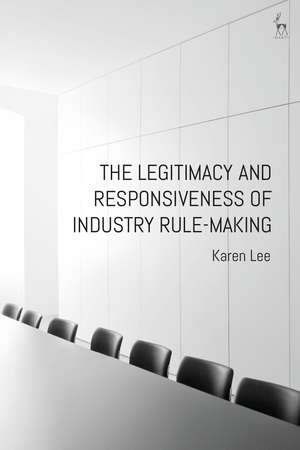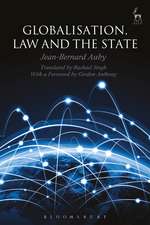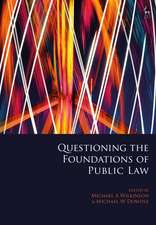The Legitimacy and Responsiveness of Industry Rule-making
Autor Dr Karen Leeen Limba Engleză Paperback – 16 dec 2020
| Toate formatele și edițiile | Preț | Express |
|---|---|---|
| Paperback (1) | 204.31 lei 3-5 săpt. | +24.57 lei 6-10 zile |
| Bloomsbury Publishing – 16 dec 2020 | 204.31 lei 3-5 săpt. | +24.57 lei 6-10 zile |
| Hardback (1) | 570.43 lei 3-5 săpt. | |
| Bloomsbury Publishing – 5 sep 2018 | 570.43 lei 3-5 săpt. |
Preț: 204.31 lei
Nou
Puncte Express: 306
Preț estimativ în valută:
39.09€ • 42.60$ • 32.94£
39.09€ • 42.60$ • 32.94£
Carte disponibilă
Livrare economică 02-16 aprilie
Livrare express 18-22 martie pentru 34.56 lei
Preluare comenzi: 021 569.72.76
Specificații
ISBN-13: 9781509943821
ISBN-10: 150994382X
Pagini: 312
Dimensiuni: 156 x 234 x 21 mm
Greutate: 0.44 kg
Editura: Bloomsbury Publishing
Colecția Hart Publishing
Locul publicării:London, United Kingdom
ISBN-10: 150994382X
Pagini: 312
Dimensiuni: 156 x 234 x 21 mm
Greutate: 0.44 kg
Editura: Bloomsbury Publishing
Colecția Hart Publishing
Locul publicării:London, United Kingdom
Caracteristici
A landmark legal monograph on industry rule-making, where private actors are allowed by legislatures and regulators to take part in (and in some cases assume responsibility for) the formation of legally binding rules.
Notă biografică
Karen Lee is Lecturer in Law at the University of New England, Australia.
Cuprins
1. Introduction I. Approach and Scope of Book II. TerminologyIII. Structure of the Book Part I. Background to Case Studies2. The Adoption of Part 6 of the Telecommunications Act 1997 (Cth) I. Introduction II. Background Information III. The Regulatory Design of Part 6 IV. Conclusion 3. The Challenges of Industry Rule-making I. Introduction II. The Rule-making Framework of the Communications AllianceIII. The Procedural and Institutional Legitimacy of Traditional Rule-making IV. The Difficulties and Threats Posed by Industry Rule-making V. Conclusion Part II. Empirical Study of Part 6 Rule-making4. The Conceptual Approach and Institutional Context I. Introduction II. Conceptual Approach III. The Institutional Context 5. The Consumer Contracts Code I. Working Committee Composition and Context II. Power III. Roles IV. Strategy V. Dispute Resolution VI. Conclusion 6. The Information on Accessibility Features for Telephone Equipment Code I. Working Committee Composition and Context II. Power III. Roles IV. Strategy V. Dispute Resolution VI. Conclusion 7. The Mobile Premium Services Code I. Working Committee Composition and Context II. Power III. Roles IV. Strategy V. Dispute Resolution VI. Conclusion Part III. Substantive Analysis of Case Studies8. The Procedural and Institutional Legitimacy of Part 6 Rule-making I. Introduction II. The Politic of Part 6 Rule-making III. The Procedural and Institutional Legitimacy of Part 6 Rule-making IV. Conclusion 9. The Responsiveness of Part 6 Rule-making I. Introduction II. Defining Responsiveness III. The Responsiveness of Part 6 Rule-making IV. Conclusion 10. Activating and Sustaining Legitimate and Responsive Industry Rule-making: The State of Play I. Introduction II. The Indicia of Legitimate and Responsive Rule-making III. Matters Requiring Further Empirical Investigation IV. Conclusion 11. Conclusion
Recenzii
While [the book's] focus is very specific to the telecommunications sector, the theory discussed and the very practical nature of many of her findings are, I believe, relevant to many sectors. In this technology driven era we find ourselves in, with the accompanying convergence between sectors and globalisation that is happening and the constant drive for innovation, industry based rule-making is likely to be an important part of the mix for how we regulate our society . It is great to see such intelligent attention applied to this issue. It is an important contribution to debates about how we and our society regulate conduct.
This volume provides a timely analysis of the potential for industry rule-making at a time when the outcomes of the Hayne Royal Commission suggest that industry rule-making in some sectors has no legitimacy... Karen's work is very readable, and this timely volume will be helpful beyond its target audience.
This book is a fascinating contribution to non-traditional law-making. It is highly worthwhile for administrative lawyers to engage with it. If, as is now legal scholarship orthodoxy, we administrative lawyers should study law in context we need informed understandings of the characteristics of the modern state. In my view, that is the primary contribution that Lee makes to our field. It helps us to understand the context in which administrative law operates. Legislative law-making is now multi-layered: authorised by parliamentary legislation, it is commonly influenced by international laws, and is often made by administrative officials. As she shows us, it is now sometimes made by the industry that is to be regulated.
This volume provides a timely analysis of the potential for industry rule-making at a time when the outcomes of the Hayne Royal Commission suggest that industry rule-making in some sectors has no legitimacy... Karen's work is very readable, and this timely volume will be helpful beyond its target audience.
This book is a fascinating contribution to non-traditional law-making. It is highly worthwhile for administrative lawyers to engage with it. If, as is now legal scholarship orthodoxy, we administrative lawyers should study law in context we need informed understandings of the characteristics of the modern state. In my view, that is the primary contribution that Lee makes to our field. It helps us to understand the context in which administrative law operates. Legislative law-making is now multi-layered: authorised by parliamentary legislation, it is commonly influenced by international laws, and is often made by administrative officials. As she shows us, it is now sometimes made by the industry that is to be regulated.










